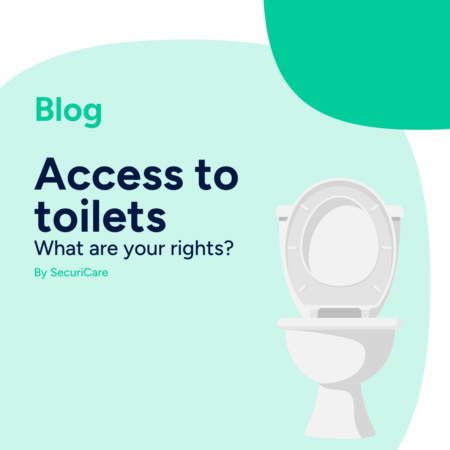Access to toilets: What are your rights?

A post on popular social media site ‘X’ (formerly known as Twitter) has recently gone viral. The tweet in question was from a user by the name of Christopher Porter-Blake, Christopher, known on X as TheAspiLawStudent, who often uses the hashtag #ManWithThePooCard, recently told how he was refused use of staff toilets at a branch of Sainsbury’s and got a very cold response from the manager.
The story, picked up by The Daily Mail, has shone a light on the challenges people face with access to toilets in public.
So, what are your rights when it comes to accessing toilets in shops or other private venues and where have all the toilets gone?
Does my place of work have to provide toilets?
If you’re employed by the organisation the regulations seem a lot simpler. According to the Health and Safety Executive (HSE)1 enough toilets and washbasins must be provided for those expected to use them. This number is based on how many people would be at work at the same time.
Reasonable adjustments must also be made for workers with disabilities2, for example if a worker needs to use a stoma bag or continence device, a bin for their disposal must be provided.
The HSE also covers the conditions the facilities must be kept in, such as being regularly cleaned, providing hot and cold water, soap, and other consumables.
Therefore, employers have a legal obligation to provide toilets to staff under The Workplace (Health, Safety and Welfare) Regulations3.
This also extends to the provision of disabled toilets. Under the Equality Act 2010, it is now illegal to discriminate against people with disabilities when it comes to toilet use or access. Any facilities offered must provide equal access for disabled people4.
What toilet facilities do private venues have to provide?
The facilities a business or venue must provide for the public varies based on the type of business.
Laws and guidance appear to vary by council. Generally, it is considered good practice in the hospitality industry to provide toilet facilities for customers. But in general, a food outlet with fewer than 10 seats or one providing takeaway services does not have to provide any toilets for customers.
This changes if the premises serves alcohol or opens after 11pm according to the online platform mylawyer.co.uk5 but the number of facilities they will need to provide will be governed by their local council.
Are cafes, restaurants and pubs required to have a toilet?
They’re only required to provide toilets for customers if certain criteria are met. Each council can then interpret and enforce this as they deem fit.
For example, East Devon council have created their own guidance which stipulates that any business involved in food provision, with any form of seating must provide at least 1 WC and 1 wash basin6.
In order to comply with the Equality Act it is likely that businesses would then provide a mixed-use accessible WC.
Not all councils have set such clear guidance as East Devon though.
Do shops and other businesses have to provide toilets?
Simply put, no they don’t. Many businesses, especially larger stores where people will spend a long time do provide them. Typically disabled and baby change facilities, but they’re under no obligation to maintain them.
Can I use the toilet if I’m not a customer?
If a hospitality venue does have a loo, it doesn’t mean they have to let you use it7. Signs such as toilets for patrons only can be familiar sights, which lead to that sinking feeling of despair when in a moment of need.
A business compelled to provide toilets, only has to for its customers. They’re not breaking any laws by preventing use of their loo to non-customers, providing they do so consistently and without prejudice.
Can I ask to use staff toilets in a shop or business?
You can ask, but they’re under no obligation to allow members of the public to use them. If you presented a toilet priority card or similar, they might allow their use.
This is covered in the Equality Act as reasonable adjustments. But it is down to the business to determine if the adjustment is reasonable. For example, a corner shop with a staff loo in a private area upstairs and 1 member of staff on-duty might say no. It would be unreasonable for them to close the store and escort a person to the toilet. It may also invalidate their insurance to allow you access to non-public areas unescorted.
What about public loos?
Sadly, the increased reliance on toilets in shops and cafes has come about since the closure of so many public loos. This might even explain why councils are now creating guidance on facilities, many argue they should be providing.
A 2016 report from the BBC8 found that 1,782 public toilet facilities had closed in the prior decade.
Many councils cited financial pressures as the reason for so many closures. These same pressures are also forcing private businesses to re-evaluate their own provision.
A recent 2023 study by the Liberal Democrats9 found a further 14% decline in the number of public conveniences in the past 5 years.
Threat to health, mobility, and equality
The decline in public toilets has led to a phenomenon that’s been dubbed the ‘loo leash’. The Royal Society for Public Health (RSPH) in its study Taking the p*** describes the loo leash as a phenomenon which prevents people from venturing far from their homes when they don’t have knowledge of toilet facilities nearby10.
This is something which is no doubt very familiar to people with bowel, bladder or prostate conditions. But it also affects those with young children, pregnant people, those with babies and those of advancing age.
The study showed that as many as 20% felt deterred about venturing far from home as much as they would like. Rising to 43% amongst those with medical conditions requiring toilet use.
This can lead to people developing poor habits around hydration, such as not drinking and holding in urine, both of which can exacerbate existing conditions.
What else can I do when I need to go?
Although they’re not guaranteed to give you access to toilets, getting yourself a toilet priority card or a just can’t wait card is a good step. These are widely recognised by large organisations. You can request a physical copy from our home delivery service.
Getting a radar key could (literally) open over 9,000 toilets in the UK. Radar keys are available at a cost of £5 to anybody with a recognised disability. We provide them free of charge to all users of our SecuriCare home delivery service.
Many of us might think of looking at our phone when we’re in the bathroom, but how many of us use of our phone to find a toilet? To tackle the problem of the loo leash, many sites have been making use of open-source maps to create databases of toilets. Here’s some of our favourites:
Finally, don’t suffer in silence. As Christopher’s tweet has shown, sometimes making a noise can make businesses listen. Voice your concerns, speak with your local councillors and look out for organisations advocating for change in the laws.
References
1 Health and Safety Executive, Have the right workplace facilities [website], https://www.hse.gov.uk/simple-health-safety/workplace-facilities/health-safety.htm, (accessed 13 March 2024).
2 Health and Safety Executive, Employers’ duties in protecting disabled workers [website], https://www.hse.gov.uk/disability/examples.htm#prostate, (accessed 13 March 2024).
3 UK Government, The Workplace (Health, Safety and Welfare) Regulations 1992, available at: https://www.legislation.gov.uk/uksi/1992/3004/regulation/20, (accessed 13 March 2024).
4 Centre for Accessible Environments, Managing Accessible Toilets, 2017, available at: https://cae.org.uk/wp-content/uploads/2017/01/CAE-Managing-Accessible-Toilets-Factsheet-Jan-2017.pdf, (accessed 13 March 2024).
5 MyLawyer, Pubs and restaurants [website], 2024, https://www.mylawyer.co.uk/complaints-about-pubs-restaurants-a-A76053D76913/#:~:text=cleaning%20damaged%20clothes.-,Toilets,sell%20alcohol%20must%20have%20toilets, (accessed 13 March 2024).
6 East Devon District Council, Public toilet provision in food businesses [website], 2021, https://eastdevon.gov.uk/environmental-health-and-wellbeing/food-hygiene-safety/public-toilet-provision-in-food-businesses/, (accessed 13 March 2024).
7 S. Stone, Would you let non-paying customers use your pub’s toilets?, 2018, available at: https://www.morningadvertiser.co.uk/Article/2018/05/23/Would-you-let-non-paying-customers-use-your-pub-s-toilets, (accessed 14 March 2024).
8 BBC News, Public toilets ‘wiped out in parts of UK’, 2016, available at: https://www.bbc.co.uk/news/uk-36405414, (accessed 13 March 2024).
9 Liberal Democrats, Loo-less Britain: Number of public toilets falls by 14% in 5 years, 2023, available at: https://www.libdems.org.uk/press/release/loo-less-britain-number-of-public-toilets-falls-by-14-in-5-years, (accessed 13 March 2024).
10 Royal Society for Public Health, Taking the P**, 2019, available at: https://www.rsph.org.uk/static/uploaded/459f4802-ae43-40b8-b5a006f6ead373e6.pdf, (accessed 13 March 2024).
Share this article:
by SecuriCare Team





